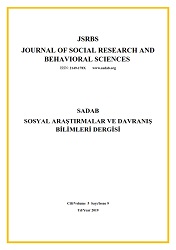Lawrence Kohlberg’in Bilişsel Ahlak Gelişim Kuramı Ve Dinlerin Hedeflediği İdeal İnsan
Lawrence Kohlberg's Cognitive Moral Development Theory and The Ideal Human Developed By Religion
Author(s): Hülya ÇetinSubject(s): Education, Ethics / Practical Philosophy, Social Philosophy, Philosophy of Religion, Sociology of Religion
Published by: SD Yayınevi
Keywords: Kohlberg; Religion; Education; morality; human;
Summary/Abstract: Morality has also existed among those who have no faith, as well as those who have a religious and moral belief throughout history. Morality can be defined as a set of attitudes, behaviors, and rules that a particular community has to adhere to the values, norms, principles, or people living in the community. Kohlberg's moral development theory, a theory that is recognized at international level and the basis for many studies. Kohlberg stated that people had six moral judicial phases. The six jurisdictions were also discussed in three levels. According to Kohlberg, people in all cultures use the same basic moral concepts as justice, equality, love, respect, authority. In addition, all individuals, regardless of cultural differences, depending on these concepts and in the same order, they go through the stages of reasoning. The difference between individuals arises only in terms of how far they move and how far they progress. On the other hand, an ideal human being is tried to be found in the religions by accepting a strong motivation source in terms of both presenting the moral principles that are appropriate to their own creation, and encouraging people to act according to these principles.
Journal: Sosyal Araştırmalar ve Davranış Bilimleri
- Issue Year: 5/2019
- Issue No: 9
- Page Range: 129-162
- Page Count: 34
- Language: Turkish

